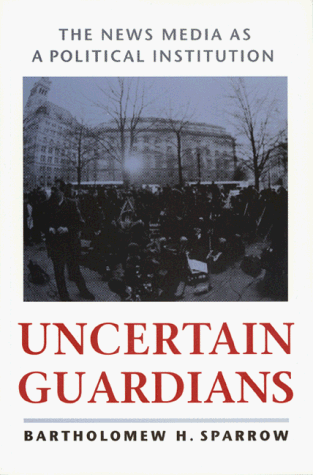Interpreting American Politics
1 total work
The news media are often presumed to be a fourth estate, or fourth branch of government, serving as a check on the other three. In this text, political scientist Bartholomew Sparrow argues that this is a mistaken notion. Instead, the media - print, radio and television - affect policy making just as other political institutions do, whether the Congress, the electoral system, or public administration. The media decide what to report, when, and how, and these decisions affect both the processes and outcomes of the political system. But the routine production of the news demands that reporters, editors, publishers and news executives work with the major political and economic actors of the political system in order to get the news and sell the news, and thus ensure the livelihoods of their organizations. Because of this dependence, however, the news media are highly constrained in their reportage. Blending interview material with his own institutional analysis, Sparrow shows that the major US news organizations act contrary to the interests of the American public and democratic government.
Because individual journalists and news organizations face serious and similar uncertainties with respect to their political credibility, their access to news sources, and their commercial performance, they rely regularly on the same practices to report the news. But these shared practices enable both journalists and politicians to manipulate political communication, government officials to mislead the public, and advertising and other business factors to have significant influence on the news; they also cause journalists to regret the damage done to democratic government. Sparrow investigates important examples in foreign, economic and health policy, in which the media were unable to serve as guardians of the public interest. He also offers profound proposals to revitalize the news media to better serve the American public and the cause of representative government.
Because individual journalists and news organizations face serious and similar uncertainties with respect to their political credibility, their access to news sources, and their commercial performance, they rely regularly on the same practices to report the news. But these shared practices enable both journalists and politicians to manipulate political communication, government officials to mislead the public, and advertising and other business factors to have significant influence on the news; they also cause journalists to regret the damage done to democratic government. Sparrow investigates important examples in foreign, economic and health policy, in which the media were unable to serve as guardians of the public interest. He also offers profound proposals to revitalize the news media to better serve the American public and the cause of representative government.
